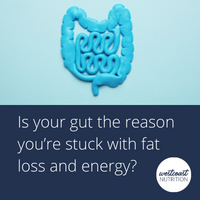I realize that talking about poop and gut stuff isn’t always comfortable, but I ask each and every client about theirs in their first session because it is such a powerful regulator of health AND metabolism. Here’s how it interferes with fat loss, how to know if your gut is part of the problem, and what to do next.
How do I know if my gut is causing sluggish weight loss?
I look at the gut as a root cause of ‘being stuck’ in my clients when they struggle with these things:
- Constipation
- Diarrhea or loose bowel movements
- Abdominal pain or discomfort after eating
- Bloating and distention (both after eating or throughout the day)
- Stinky and frequent gas
Occasional gut issues are normal – some meals will make us feel a bit bloaty, travel and diet changes might cause temporary bowel issues. None of that occasional stuff means you have deeply rooted gut issues, and from my decade in practice I can tell you that gut is not the issue for everyone (no matter what that internet guru says).
Your gut interferes with fat loss in 3 main ways:
- If you have an unhealthy microbiome (balance of good and bad gut bacteria) you don’t have enough good bacteria making butyrate.Butyrate is a short chain fatty acid that is a key messenger to your body directing insulin response. Insulin resistance and elevated insulin levels increase fat storage and make it harder to use fat for energy (which is how you lose weight -empty those storage lockers).
- Your hunger hormones might be high, telling you to eat more and making healthy portions impossible to sustain.Some of the bacteria in your microbiome also signal your hunger hormone (ghrelin) and fullness hormone (leptin). If you feel like you’re eating healthy, and eating until satisfied (but not full) and are still gaining weight or struggling to lose you might want to look at your gut as the problem! Elevated hunger hormones mean our brain will tell us to eat more than we need and losing weight while hungry all the time just isn’t a sustainable strategy – not to mention how unenjoyable it is!
- Your gut bacteria might be driving inflammation – part of our stress and immune response. Chronic low grade inflammation is well linked to overweight and obesity in the research and seems to increase fat storage rates (ugh, the opposite of what most of us want) and slow the process of taking fat out of the storage cells. Endotoxin, a chemical made by bad bacteria, predictably increases inflammation. So much so that we use it in research when we need to test inflammation in mice! Getting gut inflammation down can help make weight loss easier and more sustainable.
How do I fix it?
If gut issues are causing you discomfort, sapping energy or slowing weight loss start here:
Increase diversity of bacteria in your microbiome by expanding the variety of plant foods you eat. Increased diversity means more butyrate, more good guys, and a more resilient gut in the research.
- Mix up the fruits you eat – if you always do frozen blueberries in your smoothie try adding frozen cherries or mango some days. If you always take a banana to work, try a pear or mandarin some days.
- Try new leafy greens – if you’ve been doing iceberg or romaine forever, experiment with kale, arugula, baby spinach, bok choy (delicious grilled FYI) or spring mix! Greens have some especially potent anti-inflammatory nutrients to help soothe that gut.
- Try to include whole food carbs in place of wheat flour all the time. Wheat is not the devil for everyone, but we do eat an awful lot of it. Try sweet potato slices under your sloppy joe, serving your pasta sauce on zucchini, parsnip or sweet potato noodles. Pop quinoa or wild rice under your stir fries instead of noodles. Different whole grains and starchy veggies will have different (and more) fibres which increases diversity in your gut!
- Add seeds to your yogurt, smoothies or salads. They’re higher in fibre than nuts and provide great crunch and anti-inflammatory fats. Pumpkin seeds are my fave, and I also use sunflower, chia and flax often.
- Experiment with fermented foods if your gut issues are mild to moderate (not if they’re severe)
- Try fermented veggies like kimchi or sauerkraut in sandwiches or on eggs. Look for fresh, not pasteurized (shelf stable ones are pasteurized, which kills off the good bacteria).
- Make your smoothie with kefir or yogurt instead of water or almond milk.
- Sip on a lower sugar kombucha
If you’ve been struggling for a long time with your gut, or your symptoms are severe and happening often, get some help. You likely will need a personalized approach to treat the root cause of what’s going on before being able to move to diversity building strategies like these. You’re not alone! 75% of my clients who come for weight loss also have gut issues. If this sounds like you – reach out and reply here. I’d love to chat and help you get your gut sorted and you feeling good in your skin.
Need some help getting your meals for the week balanced and prepared? If you’d like to receive our free Meal Planning Getting Started Guide AND get in on our weekly emails about all things nutrition so you can get clarity and confidence on what you’re eating, join us here!







